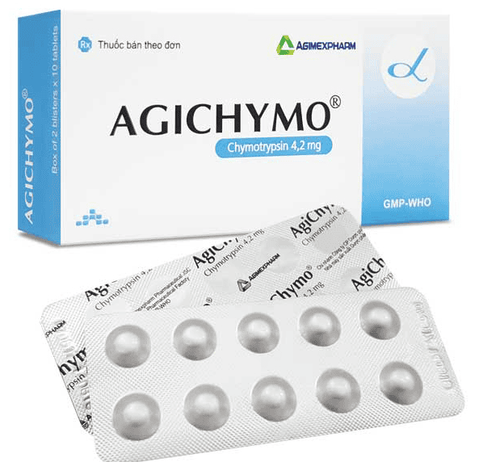This is an automatically translated article.
Alphabiotic is a drug commonly used in cases of trauma, patients after surgery and to treat a number of other medical conditions. So what does Alphabiotic drug do and how to use this drug?
1. What are the effects of Alphabiotic drugs?
Alphabiotic medicine is formulated in tablet form with the main ingredient in each tablet is Chymotrypsin 21 microkatsin equivalent to 4200 USP units.
Alpha chymotrypsin is an enzyme prepared by activating chymotrypsinogen, it is extracted from bovine pancreas. Alpha-chymotrypsin is a proteolytic enzyme, it has a selective catalytic effect on peptide bonds adjacent to aromatic amino acids.
This enzyme is used in ophthalmology to dissolve the delicate ligament that suspends the lens, making it easier to remove the cloudy nucleus in the capsule and reduce trauma to the eye. However, it does not resolve the case of vitreous adhesions with other structures of the eye. Enzyme solution at a ratio of 1:5,000 usually breaks down the suspensory ligament in about 2 minutes and a solution of 1:10,000 in about 4 minutes. Chymotrypsin is also used to reduce inflammation and soft tissue edema caused by abscesses, ulcers, and trauma, and to help loosen upper respiratory tract secretions in patients with asthma, bronchitis, lung diseases, and sinusitis.
2. Indications and contraindications of the drug Alphabiotic
Alphabiotic drugs are indicated in the following cases:
Treatment of edema caused by trauma or after surgery. Used to reduce inflammation and soft tissue edema caused by abscesses, ulcers. Used to loosen upper respiratory tract secretions in patients with asthma, bronchitis, lung diseases and sinusitis. Alphabiotic drugs are contraindicated in the following cases:
People with hypersensitivity to Chymotrypsin or any other component of the preparation. Caution when using Alphabiotics:
Because of the potential to cause vitreous loss, Alphabiotics are not recommended for cataract surgery in patients under 20 years of age. Alphabiotics should not be used in patients with increased vitreous pressure and open wounds or congenital cataracts. Alphabiotic does not affect the ability to drive and use machines. There is no information on the use of Alphabiotics during pregnancy and lactation. Alphabiotics should be used in this population when the expected outcome outweighs any possible risk.
3. Dosage and how to use Alphabiotics
Alphabiotics are taken by mouth or by sublingual tablets to allow the tablets to dissolve slowly.
Dosage of Alphabiotic drugs should be according to the doctor's prescription. The reference dose for the treatment of edema after trauma or surgery and the case of loosening secretions in the upper respiratory tract is as follows:
Use a dose of 2 tablets / time x 3-4 times / day or sublingually 4-6 tablets/day divided into several times.
4. Undesirable effects of the drug Alphabiotic
During the use of Alphabiotics, you may encounter some side effects of the drug as follows:
The most common side effect of the drug is a temporary increase in intraocular pressure caused by debris of the destroyed ligament. wiring network. When using the drug in ophthalmology, there may be side effects: Corneal edema, uveitis. Sometimes there are allergic reactions. During the use of Alphabiotic drugs, if you see any unusual symptoms, you should immediately notify your doctor or go to the nearest medical facility to receive timely support from medical staff.
Please dial HOTLINE for more information or register for an appointment HERE. Download MyVinmec app to make appointments faster and to manage your bookings easily.













